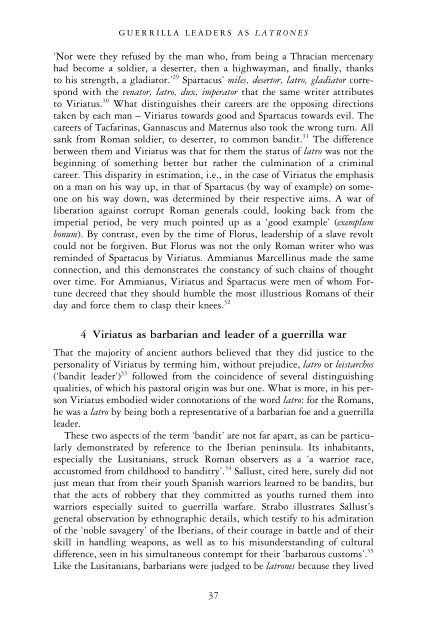You also want an ePaper? Increase the reach of your titles
YUMPU automatically turns print PDFs into web optimized ePapers that Google loves.
GUERRILLA LEADERS AS LATRONES<br />
‘Nor were they refused by the man who, from being a Thracian mercenary<br />
had become a soldier, a deserter, then a highwayman, and finally, thanks<br />
to his strength, a gladiator.’ 29 Spartacus’ miles, desertor, latro, gladiator correspond<br />
with the venator, latro, dux, imperator that the same writer attributes<br />
to Viriatus. 30 What distinguishes their careers are the opposing directions<br />
taken by each man – Viriatus towards good and Spartacus towards evil. The<br />
careers of Tacfarinas, Gannascus and Maternus also took the wrong turn. All<br />
sank from Roman soldier, to deserter, to common bandit. 31 The difference<br />
between them and Viriatus was that for them the status of latro was not the<br />
beginning of something better but rather the culmination of a criminal<br />
career. This disparity in estimation, i.e., in the case of Viriatus the emphasis<br />
on a man on his way up, in that of Spartacus (by way of example) on someone<br />
on his way down, was determined by their respective aims. A war of<br />
liberation against corrupt Roman generals could, looking back from the<br />
imperial period, be very much pointed up as a ‘good example’ (exemplum<br />
bonum). By contrast, even by the time of Florus, leadership of a slave revolt<br />
could not be forgiven. But Florus was not the only Roman writer who was<br />
reminded of Spartacus by Viriatus. Ammianus Marcellinus made the same<br />
connection, and this demonstrates the constancy of such chains of thought<br />
over time. For Ammianus, Viriatus and Spartacus were men of whom Fortune<br />
decreed that they should humble the most illustrious Romans of their<br />
day and force them to clasp their knees. 32<br />
4 Viriatus as barbarian and leader of a guerrilla war<br />
That the majority of ancient authors believed that they did justice to the<br />
personality of Viriatus by terming him, without prejudice, latro or leistarchos<br />
(‘bandit leader’) 33 followed from the coincidence of several distinguishing<br />
qualities, of which his pastoral origin was but one. What is more, in his person<br />
Viriatus embodied wider connotations of the word latro: for the Romans,<br />
he was a latro by being both a representative of a barbarian foe and a guerrilla<br />
leader.<br />
These two aspects of the term ‘bandit’ are not far apart, as can be particularly<br />
demonstrated by reference to the Iberian peninsula. Its inhabitants,<br />
especially the Lusitanians, struck Roman observers as a ‘a warrior race,<br />
accustomed from childhood to banditry’. 34 Sallust, cited here, surely did not<br />
just mean that from their youth Spanish warriors learned to be bandits, but<br />
that the acts of robbery that they committed as youths turned them into<br />
warriors especially suited to guerrilla warfare. Strabo illustrates Sallust’s<br />
general observation by ethnographic details, which testify to his admiration<br />
of the ‘noble savagery’ of the Iberians, of their courage in battle and of their<br />
skill in handling weapons, as well as to his misunderstanding of cultural<br />
difference, seen in his simultaneous contempt for their ‘barbarous customs’. 35<br />
Like the Lusitanians, barbarians were judged to be <strong>latrones</strong> because they lived<br />
37


